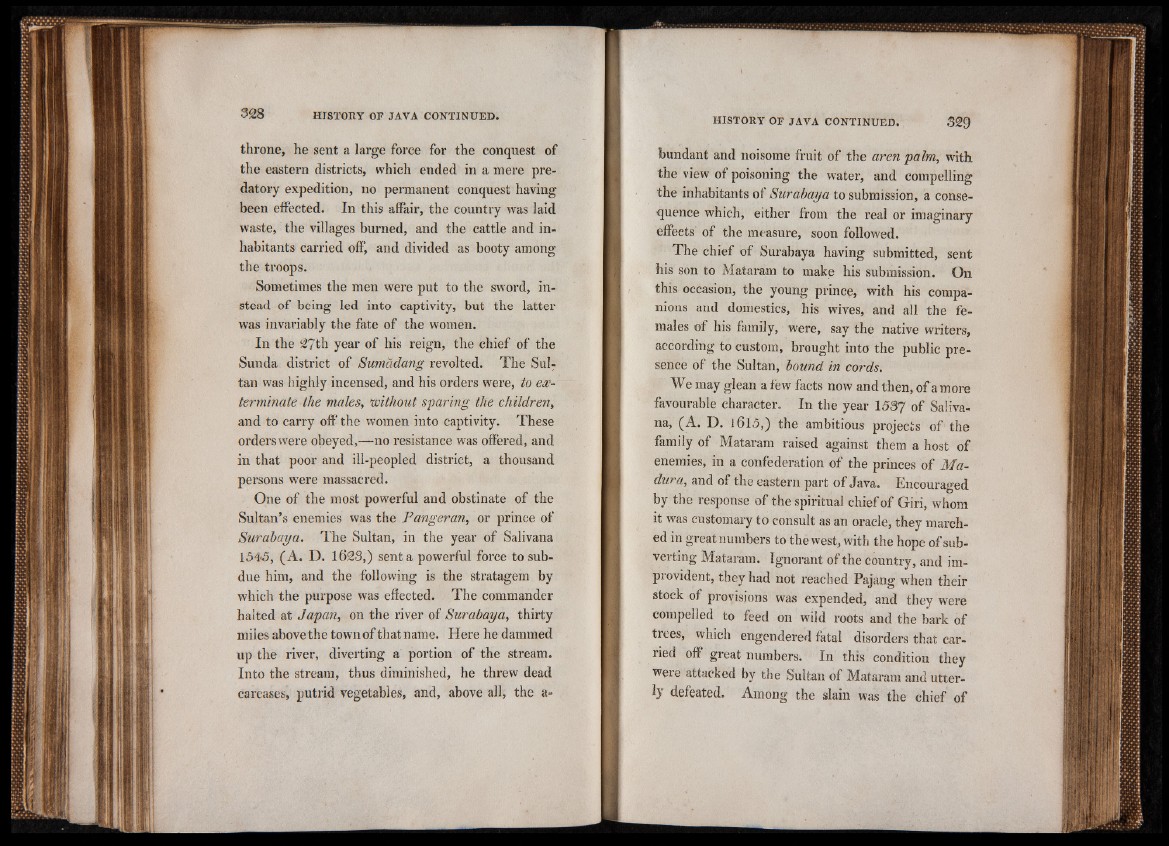
throne, he sent a large force for the conquest of
the eastern districts, which ended in a mere predatory
expedition, no permanent conquest having
been effected. In this affair, the country was laid
waste, the villages burned, and the cattle and inhabitants
carried off, and divided as booty among
the troops.
Sometimes the men were put to the sword, instead
of being led into captivity, but the latter
was invariably the fate of the women.
In the 27th year of his reign, the chief of the
Sunda district of Sumadang revolted. The Sultan
was highly incensed, and his orders were, to exterminate
the males, without sparing the children,
and to carry off the women into captivity. These
orders were obeyed,—no resistance was offered, and
in that poor and ill-peopled district, a thousand
persons were massacred.
One of the most powerful and obstinate of the
Sultan’s enemies was the Pangeran, or prince of
Surabaya. The Sultan, in the year of Salivana
1543, (A. D. 1623,) sent a powerful force to subdue
him, and the following is the stratagem by
which the purpose was effected. The commander
halted at Japan, on the river of Surabaya, thirty
miles above the town of that name. Here he dammed
up the river, diverting a portion of the stream.
Into the stream, thus diminished, he threw dead
carcases, putrid vegetables, and, above all, the abundant
and noisome fruit of the aren palm, with
the view of poisoning the water, and compelling
the inhabitants of Surabaya to submission, a consequence
which, either from the real or imaginary
effects of the measure, soon followed.
The chief of Surabaya having submitted, sent
his son to Mataram to make his submission. On
this occasion, the young prince, with his companions
and domestics, his wives, and all the females
of his family, were, say the native writers,
according to custom, brought into the public presence
of the Sultan, bound in cords.
We may glean a few facts now and then, of a more
favourable character. In the year 1537 of Salivana,
(A. D. 1615,) the ambitious projects of the
family of Mataram raised against them a host of
enemies, in a confederation of the princes of Madura,
and of the eastern part of Java. Encouraged
by the response of the spiritual chief of Giri, whom
it was customary to consult as an oracle, they marched
in great numbers to the west, with the hope of subverting
Mataram. Ignorant of the country, and improvident,
they had not reached Pajang when their
stock of provisions was expended, and they were
compelled to feed on wild roots and the bark of
trees, which engendered fatal disorders that carried
off great numbers. In this condition they
were attacked by the Sultan of Mataram and utterly
defeated. Among the slain was the chief of